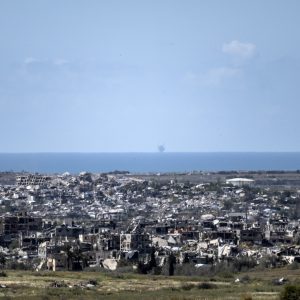Trump’s shadow looms over COP29: Key Issues to watch at crucial Climate Summit
As COP29 begins in Baku, experts highlight that its success hinges on whether countries can unite for meaningful commitments, despite uncertainty introduced by Donald Trump’s potential reelection
MNTV DESK
BAKU, Azerbaijan (MNTV) – As the 29th United Nations Climate Change Conference (COP29) officially opened in Baku, Azerbaijan, on Monday, the global stage is set for intense negotiations.
However, the shadow of U.S. President Donald Trump’s recent reelection looms large over the proceedings, bringing uncertainty to discussions that are already fraught with complexity.
The world’s leaders, with around 100 expected to attend, are gathered in Baku to confront urgent issues such as climate finance, food systems, fossil fuel dependency, and the accelerating impacts of climate change.
But with Trump’s return to power, the outcome of COP29 could be less predictable, potentially reversing the progress made in tackling climate change over the past few years.
The stakes at COP29 are high. With global temperatures continuing to rise and the climate crisis worsening, many see this summit as one of the last chances to set ambitious goals for limiting global warming to 1.5°C above pre-industrial levels.
Yet, the recent reelection of Donald Trump, a well-known climate skeptic, has cast a long shadow over the conference.
During his first presidency, Trump withdrew the U.S. from the Paris Agreement, a decision that could be repeated, leaving the global community scrambling for alternatives.
While President Joe Biden, whose administration rejoined the Paris Agreement, is not expected to attend COP29, a delegation from his White House will still participate.
However, the U.S. delegation will be in a “lame duck” status, as Trump is set to take office in January.
This raise concerns that, although the U.S. delegation can participate in negotiations, they will not be able to commit the U.S. to future financial promises, making the talks more complex.
The possibility of the U.S. withdrawing from the Paris Agreement once again presents a significant challenge.
In a virtual press conference, Jonathan Pershing, former climate official in the Obama administration, expressed doubt that other countries would follow the U.S. in pulling out, but the repercussions could still be severe.
The U.S. is a major contributor to the United Nations Framework Convention on Climate Change (UNFCCC) budget, and its departure could undermine the financial foundation of international climate efforts.
Climate finance: Critical issue for developing countries
At the heart of COP29 is the issue of climate finance, often referred to as the “finance COP.” This year’s summit will focus on negotiations aimed at securing a new collective quantified goal (NCQG) for climate finance.
Developing nations are seeking assurances that trillions of dollars will flow to them in the coming decade to help curb greenhouse gas emissions and cope with the increasingly severe impacts of climate change.
While a $100 billion annual target for climate finance was set in 2009, it was only achieved in 2022, and much of this funding has been in the form of loans, which countries must repay. Developing nations are pushing for more grants, as they argue that loan-based models do not provide the long-term support needed to tackle climate challenges effectively.
To meet the ambitious climate goals of limiting global warming to 1.5°C, experts are calling for a substantial increase in climate finance, with some suggesting that the target should rise to $1 trillion annually.
The U.N. and other organizations are urging richer nations to step up, but with the potential retreat of the U.S. from financial commitments, much of the pressure will fall on the European Union and China. The role of innovative finance mechanisms, such as taxes, subsidies, and fossil fuel profits, will also be a topic of discussion at COP29.
Loss and Damage: Compensation for vulnerable nations
One of the most contentious issues in climate negotiations is the “loss and damage” fund, which was established at COP27 following years of pressure from low- and middle-income countries (LMICs) and small island nations.
These nations argue that they should be compensated for the irreversible impacts of climate change, such as rising sea levels and extreme weather events.
The loss and damage fund, which has received pledges amounting to $700 million so far, aims to provide financial assistance to these countries. However, experts warn that the estimated needs could be as high as $400 billion.
At COP29, discussions are expected to center around how much money should be dedicated to the loss and damage fund, as well as the specific criteria for which countries will qualify for funding.
While the fund’s independence remains a point of contention, with wealthier nations pushing for it to be hosted by the World Bank, it is clear that more clarity is needed on how to make the fund operational.
The fund will also need to explore innovative financing mechanisms to ensure it can meet the growing needs of vulnerable nations.
Nationally determined contributions: Last chance for action?
Nationally determined contributions (NDCs), which outline a country’s climate action plans under the Paris Agreement, will also be a focal point at COP29.
These plans are not legally binding but set short- to medium-term targets for reducing greenhouse gas emissions.
The next set of NDCs is due by February 2025, and some countries are expected to announce updated plans at the summit.
The urgency of COP29 stems from the fact that this could be the last opportunity for nations to adopt stronger NDCs and commit to more ambitious targets. If countries fail to meet their targets, the world’s chances of keeping global warming below 1.5°C will significantly diminish.
Developing nations, in particular, are looking for increased financial support to help them meet their NDCs, which could be less robust if financial commitments are not forthcoming.
Food systems: Silent contributor to climate change
Another significant topic at COP29 is food systems. Agriculture, which is both a major emitter of greenhouse gases and highly vulnerable to climate change, has historically been sidelined in climate negotiations.
However, at COP28, food systems took center stage, with a growing recognition of their role in both mitigation and adaptation strategies.
The UAE Declaration on Sustainable Agriculture, signed by 160 countries, commits nations to scale up adaptation and resilience for food producers, enhance food security, and integrate agriculture into national climate plans.
Yet, smallholder farmers, who are responsible for up to 80% of food production in some regions, still receive less than 1% of total climate finance.
Addressing this imbalance is crucial to ensuring that food systems can adapt to climate change while also reducing their emissions. COP29 may see new financial commitments aimed at supporting smallholder farmers and building resilience in food systems.
Carbon trading: A controversial solution
The issue of carbon trading, particularly under Article 6 of the Paris Agreement, remains one of the most debated topics in climate negotiations.
While carbon trading has the potential to provide flexibility for countries to meet their climate targets, concerns about its transparency, effectiveness, and fairness persist.
Critics argue that carbon credits allow major polluters to continue emitting greenhouse gases while purchasing credits from countries or projects that have reduced emissions.
COP29 will likely focus on finding a consensus on how to improve the carbon credit system, ensuring that it is equitable and transparent.
Negotiators, especially those from Africa, where many offset projects are likely to take place, are hoping to reach an agreement that addresses the flaws in the current system.
Controversial host: Azerbaijan’s role at COP29
Like UAE, Azerbaijan’s role as host of COP29 has raised concerns, given its heavy reliance on fossil fuels.
The country, which has been producing oil since the 19th century, remains a petrostate, and its recent natural gas exports to the European Union have raised questions about its commitment to a transition away from fossil fuels.
Some experts have called for limiting the influence of fossil fuel lobbyists at COP29, especially in light of the more than 2,000 such lobbyists who attended last year’s conference.
As COP29 unfolds in Baku, the road ahead is filled with challenges. Experts say, while reelection of Donald Trump has introduced uncertainty into the negotiations, the conference’s success will depend on whether countries can come together to make meaningful commitments.
Climate finance, loss and damage, and the transition away from fossil fuels remain central issues, but progress on these fronts will require significant political will.
Whether COP29 will be remembered as a breakthrough moment or a missed opportunity remains to be seen, but the stakes for the planet have never been higher.









